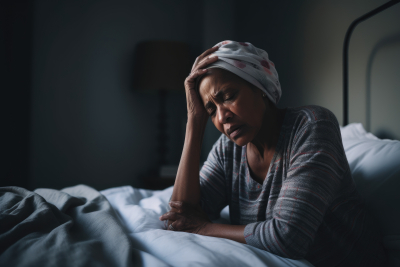New Brunswick, N.J., December 1, 2023 – Fatigue, usually described as feeling tired, weak or exhausted, can result from the side effects of cancer treatment or the disease itself, and may be physical, mental, or emotional. M. Hamza Habib MD, JD, MBA, FACP, FAAHPM, FRCPI, director of Outpatient Palliative Medicine and Cancer Pain Service at Rutgers Cancer Institute of New Jersey and RWJBarnabas Health, the state’s only NCI-designated Comprehensive Cancer Center, shares more about cancer-related fatigue and how patients can work with their health care team to manage it.
Most patients with cancer experience fatigue. How much fatigue a person has and how long it lasts may be related to their type of cancer, what treatments they’re getting, and their overall general health. Cancer treatments such as chemotherapy, radiation therapy, hormone therapy, bone marrow transplantation, and immunotherapy can cause fatigue. Other causes of fatigue may include infection, pain, dehydration or loss of appetite, trouble sleeping, anemia or emotional challenges like depression. 
Cancer fatigue is different from fatigue that healthy people feel. Physical activities that a person were previously able to easily complete may now leave a person exhausted. Routine daily activities, such as bathing or dressing, can become overwhelming. Cancer-related fatigue could make it hard or impossible to meet one’s everyday personal needs in addition to responsibilities related to family or work.
Fatigue can impact quality of life, but it can be managed. Treatment of fatigue depends on the symptoms and whether the cause of fatigue is known, which requires a patient and their cancer care team to look at all the possibilities. Good pain and symptom control, and getting a restful night sleep can reduce cancer related fatigue. Additional lifestyle tips that may help alleviate fatigue include drinking plenty of fluids, making an effort to eat at least three meals a day, and engaging in exercise to increase energy levels. For some people, relaxation exercises, listening to music, spending time in quiet natural settings, attending support groups, and reading are ways that can help lessen your fatigue.
It is important to continue talking about fatigue with your healthcare team. When talking with your healthcare provider, it can be helpful to describe how your fatigue affects your daily activities and routines. Palliative care can help with fatigue and other physical symptoms like nausea, shortness of breath, and insomnia. Learn more about the Palliative Medicine and Supportive Care Program at Rutgers Cancer Institute and Robert Wood Johnson University Hospital.
Dr. Habib is also an associate professor of medicine at Rutgers Robert Wood Johnson Medical School. Rutgers Cancer Institute and RWJBarnabas Health is the state’s leading cancer program and only National Cancer Institute -designated Comprehensive Cancer Center.
For journalists – contact:
Krista Didzbalis
Media Relations Specialist
732-507-8307
krista.didzbalis@rutgers.edu

